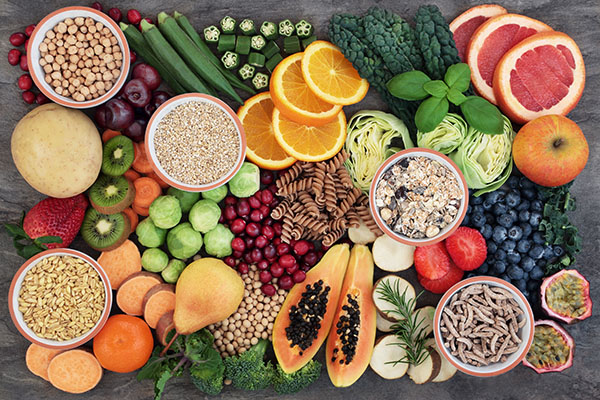Gut health matters: The benefits of fiber for overall well-being
June 5, 2024Categories: Blog Posts
Tags: Nutrition
 Did you know fiber plays a crucial role in our overall health, from supporting digestive function to promoting heart health and weight management?
Did you know fiber plays a crucial role in our overall health, from supporting digestive function to promoting heart health and weight management?
Fiber comes in two main types—soluble and insoluble—based on the amount of time it takes the body to digest and absorb it. Mercy Fitzgerald Hospital Chief of Gastroenterology, Steven Lichtenstein, DO, shares the health benefits of a fiber-rich diet.
A majority of the fiber we get in our diets, such as wheat, whole grains and rye, is harder to digest. These foods are rich in insoluble fiber, which adds bulk to stool and promotes regular bowel movements, in addition to helping treat constipation, diarrhea and hemorrhoids.
On the other hand, foods rich in soluble fiber can reduce the risk of heart disease, type 2 diabetes and stroke.
Many fruits, vegetables, legumes, and seeds contain both types of fiber. The skin or outer layer often provides insoluble fiber, while the nutrients inside have soluble fiber.
“This combination of fibers helps support digestive health, regulates blood sugar and cholesterol levels, and promotes overall well-being,” Dr. Lichtenstein says. “Incorporating a variety of these fiber-rich foods into your diet can help you achieve a balanced intake of both soluble and insoluble fiber for optimal health.”
The daily recommended intake of fiber is about 20 to 35 grams. While current research doesn’t suggest any negative effects of consuming ‘too much fiber,’ higher intake may lead to gastrointestinal side effects such as bloating, abdominal cramping and gas.
“Most people will notice fewer bloating and gas side effects when consuming soluble fiber compared to insoluble fiber,” Dr. Lichtenstein adds. “I always advise my patients to start slow when adding fiber to their diet, and gradually increase daily intake to help avoid these potential symptoms.”
To help you incorporate a balanced mix of soluble and insoluble fiber into your diet, we've highlighted foods rich in each type and those that contain both. Understanding these fiber sources can guide you in making choices that support better digestive health and overall well-being.
Foods with insoluble fiber
Bell peppers
Cabbage
Cauliflower
Celery
Corn
Grapes
Green beans
Popcorn
Foods with soluble fiber
Bananas
Broccoli
Chia seeds
Flaxseed
Mangoes
Peas
Sweet potatoes
Spinach
Foods with both
Almonds
Apples
Berries
Black beans
Brown rice
Brussels sprouts
Carrots
Oranges
Talk with your provider to learn how adding fiber to your diet can positively impact your health. Learn more about Digestive Health services at Trinity Health Mid-Atlantic.
